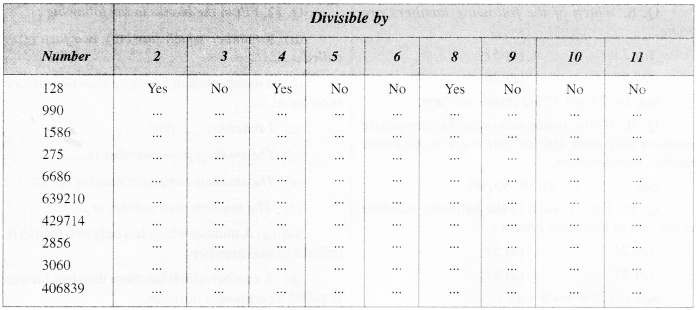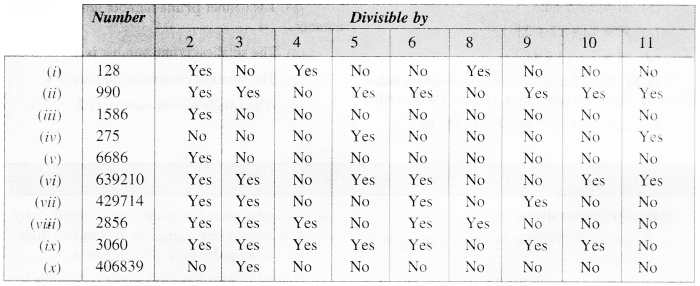NCERT Solutions for Class 6 Maths Exercise 3.3 Chapter 3. NCERT Solutions For Class 6 Maths Chapter 3 Exercise 3.3. NCERT Solutions for Class 6 Maths Chapter 3
NCERT Solutions for Class 6 Maths Chapter 3 Playing With Numbers Ex 3.3
Question 1.
Using divisibility tests, determine which the following numbers are divisible by 2; by 3; by 4; by 5; by 6; by 8; by 9; by 10; by 11; (say yes or no):


Solution :


Question 2.
Using divisibility tests, determine which of the following numbers are divisible by 4: by 8:
(a) 572
(b) 726352
(C) 5500
(d) 6000
(e) 12159
(f) 14560
(g) 21084
(h) 31795072
(i) 1700
(j) 2150.
Solution :
(a) 572
(i) Divisibility by 4
The number formed by last two digits = 72


∵ Remainder is 0
∴ 72 is divisible by 4
∴ 572 is divisible by 4.
(ii) Divisibility by 8
The number formed by last three digits = 572


∵ Remainder = 4 ≠ 0
∴ 572 is not divisible by 8.
(b) 726352
(i) Divisibility by 4
The number formed by last two digits = 52


∵ Remainder is 0
∴ 52 is divisible by 4
∴ 726352 is divisible by 4.
(ii) Divisibility by 8
The number formed by last three digits = 352


∵ Remainder is 0
∴ 352 is divisible by 8
∴ 726352 is divisible by 8.
(c) 5500
(i) Divisibility by 4
The number formed by last two digits = 00, which is divisible by 4 5500 is divisible by 4.
∴ 500 is Divisibility by 4
(ii)
The number formed by last three digits = 500


∵ Remainder 4 0
∴ 500 is not divisible by 8
∴ 5500 is not divisible by 8.
(d) 6000
(i) Divisibility by 4
The number formed by last two digits = 00, which is divisible by 4
6000 is divisible by 4.
(ii) Divisibility by 8
The number formed by last three digits = 000, which is divisible by 8 6000 is divisible by 8.
6000 is divisible by 8
(e) 12159
(i) Divisibility by 4
The number formed by last two digits = 59


∵ Remainder = 3 ≠ 0
∴ 59 is not divisible by 4.
∴ 12159 is not divisible by 4.
(ii) Divisibility by 8
The number formed by last three digits =159


∵ Remainder 7 ≠ 0
∴ 159 is not divisible by 8
∴ 12159 is not divisible by 8.
(f) 14560
(i) Divisibility by 4
The number formed by last two digits = 60


∵ Remainder is 0
∴ 60 is divisible by 4
∴ 14560 is divisible by 4.
(ii) Divisibility by 8
The number formed by last three digits = 560


∵ Remainder is 0
∴ 560 is divisible by 8
∴ 14560 is divisible by 8.
(g) 21084
(i) Divisibility by 4
The number formed by last two digits = 84


∵ Remainder is 0
∴ 484 is divisible by 4
∴ 21084 is divisible by 4.
(ii) Divisibility by 8
The number formed by last three digits = 84


∵ The remainder is not 0
∴ 84 is not divisible by 8
∴ 21084 is not divisible by 8.
(h) 31795072
(i) Divisibility by 4
The number formed by last two digits = 72


∵ Remainder is 0
∴ 72 is divisible by 4
∴ 31795072 is divisible by 4.
(ii) Divisibility by 8
The number formed by last three digits = 72


∵ Remainder is 0
∴ 72 is divisible by 8
∴ 31795072 is divisible by 8.
(i) 1700
(i) Divisibility by 4
The number formed by last two digits = 00, which is divisible by 4
∴ 1700 is divisible by
(ii) Divisibility by 8
The number formed by last three digits = 700


∵ Remainder 4 ≠ 0
∴ 700 is not divisible by 8
∴ 1700 is not divisible by 8.
(j) 2150
(i) Divisibility by 4
The number formed by last two digits = 50


∵ Remainder = 2 ≠ 0
∴ 50 is not divisible by 4
∴ 2150 is not divisible by 4.
(ii) Divisibility by 8
The number formed by last three digits =150


∵ Remainder 6 ≠ 0
∴ 150 is not divisible by 8
∴ 2150 is not divisible by 8.
Question 3.
Using divisibility tests, determine which of following numbers are divisible by 6 :
(a)297144
(b) 1258
(c) 4335
(d) 61233
(e) 901352
(f) 438750
(g) 1790184
(h) 12583
(i) 639210
(j) 17852.
Solution :
We know that number is divisible by 6 if it is divisible by 2 and 3 both.
(a) 297144
(i) Divisibility by 2
Unit’s digit = 4
297144 is divisible by 2.
(ii) Divisibility by 3
Sum of the digits = 2 + 9 + 7 + 1+ 4 + 4 = 27, which is divisible by 3 297144 is divisible by 3 Since, 297144 is divisible by 2 and 3 both, so it is divisible by 6.
(b) 1258
(i) Divisibility by 2 Unit’s digit = 8 1258 is divisible by 2.
(ii) Divisibility by 3 Sum of the digits =1+2 + 5 + 8=16 which is not divisible by 3 1258 is not divisible by 3. Since 1258 is divisible by 2 but not by 3. so 1258 is not divisible by 6.
(c) 4335
(i) Divisibility by 2
Unit’s digit = 5, which is not any of the digits 0, 2, 4, 6 or 8 4335 is not divisible by 2 4335 is not divisible by 6.
(d) 61233
(i) Divisibility by 2
Unit’s digit = 3, which is not any of the digits 0, 2, 4, 6 or 8
61233 is not divisible by 2
61233 is not divisible by 6.
(e) 901352
(i) Divisibility by 2 v Unit’s digit = 2
901352 is divisible by 2.
(ii) Divisibility by 3
Sum of the digits = 9 + 0+1+3 + 5 + 2 = 20, which is not divisible by 3
901352 is not divisible by 3 Since, 901352 is divisible by 2 but not by 3, so it is not divisible by 6.
(f) 438750
(i) Divisibility by 2 v Unit’s digit = 0
438750 is divisible by 2.
(ii) Divisibility by 3
Sum of the digits = 4 + 3 + 8 + 7 + 5+ 0 = 27, which is divisible by 3
438750 is divisible by 3 Since, 438750 is divisible by 2 and 3 both, so it is divisible by 6.
(g) 1790184
(i) Divisibility by 2 v Unit’s digit = 4
1790184 is divisible by 2.
(ii) Divisibility by 3
Sum of the digits =1+7 + 9 + 0+1 + 8 + 4=30, which is divisible by 3
1790184 is divisible by 3 Since, 1790184 is divisible by 2 and 3 both, so it is divisible by 6.
(h) 12583,
(i) Divisibility by 2
Unit’s digit = 3, which is not any of the digits 0, 2, 4, 6 or 8
12583 is not divisible by 2
12583 is not divisible by 6.
(i) 639210
(i) Divisibility by 2
Unit’s digit = 0
639210 is divisible by 2.
(ii) Divisibility by 3
Sum of the digits = 6 + 3 + 9 + 2+1+0 = 21, which is divisible by 3
639210 is divisible by 3 Since, 639210 is divisible by 2 and 3 both, so it is divisible by 6.
(j) 17852
(i) Divisibility by 2
Unit’s digit = 2
∴ 17852 is divisible by 2.
(ii) Divisibility by 3 Sum of the digits =1+7 + 8 + 5 + 2 = 23, which is not divisible by 3
17852 is not divisible by 3
Since 17852 is divisible by 2 but not by 3, so it is not divisible by 6.
Question 4.
Using divisibility tests, determine which of the following numbers are divisible by 11:
(a) 5445
(b) 10824
(c) 7138965
(d) 70169308
(e) 10000001
(f) 901153.
Solution :
(a) 5445
Sum of the digits (at odd places) from the right =5+4=9
Sum of the digits (at even places) from the right =4+5=9
Difference of these sums = 9-9 = 0 v 0 is divisible by 11
5445 is divisible by 11.
(b) 10824
Sum of the digits (at odd places) from the right = 4 + 8+1 = 13
Sum of the digits (at even places) from the right = 2 + 0 = 2
Difference of these sums = 13 – 2 = 11
11 is divisible by 11
10824 is divisible by 11.
(c) 7138965
Sum of the digits (at odd places) from the right =5+9+3+7=24
Sum of the digits (at even places) from the right = 6 + 8 + 1 = 15
Difference of these sums = 24 – 15 = 9
Y 9 is not divisible by 11
∴ 7138965 is not divisible by 11.
(d) 70169308
Sum of the digits (at odd places) from the right = 8 + 3+6 + 0=17
Sum of the digits (at even places) from the right = 0 + 9 + 1+7=17 Difference of these sums = 17-17=0
Y 0 is divisible by 11
∴ 70169308 is divisible by 11.
(e) 10000001
Sum of the digits (at odd places) from the right =l+0+0+0=l
Sum of the digits (at even places) from the right =0+0+0+1=1 Difference of these sums =1-1=0 0 is divisible by 11
∴ 10000001 is divisible by 11.
(f) 901153
Sum of the digits (at odd places) from the right = 3+ 1 +0 = 4
Sum of the digits (at even places) from the right = 5+1+9=15
Difference of these sums =15-4=11
Y 11 is divisible by 11
∴ 901153 is divisible by 11.
Question 5.
Write the smallest digit and the largest digit in the blank space of each of the following numbers so that the number is divisible by 3:
(a) __ 6724
(b) 4765 __ 2.
Solution :
(a) __ 6724
(i) Smallest digit
Sum of the given digits = 6 + 7 + 2 + 4=19
19 is not divisible by 3
∴ Smallest digit (non-zero) is 2.
(ii) Largest digit The largest digit is 8.
(b) 4765 _ 2
(i) Smallest digit
Sum of the given digits = 4 + 7 + 6 + 5 + 2 = 24 Y 24 is divisible by 3
∴ Smallest digit is 0.
(ii) Largest digit The largest digit is 9.
Question 6.
Write digit in the blank space of each of the following numbers so that the number is divisible by 11:
(a) 92 __ 389
(b) 8 __ 9484.
Solution :
(a) 92 __ 389
Sum of the given digits (at odd places) from the right = 9 + 3 + 2= 14
Sum of the given digits (at even places) from the right = 8 + required digit + 9 = required digit + 17
Difference of these sums = required digit + 3 For the above difference to be divisible by 11, required digit = 8.
Hence, the required number is 92 8 389.
(b) 8 __ 9484
Sum of the given digits (at odd places) from the right = 4 + 4 + required digit = 8 + required digit
Sum of the given digits (at even places) from the right = 8 + 9 + 8 = 25
Difference of the sums = 17 – required digit For the above difference to be divisible by 11, required digit = 6.
Hence, the required number is 8 6 9484.
